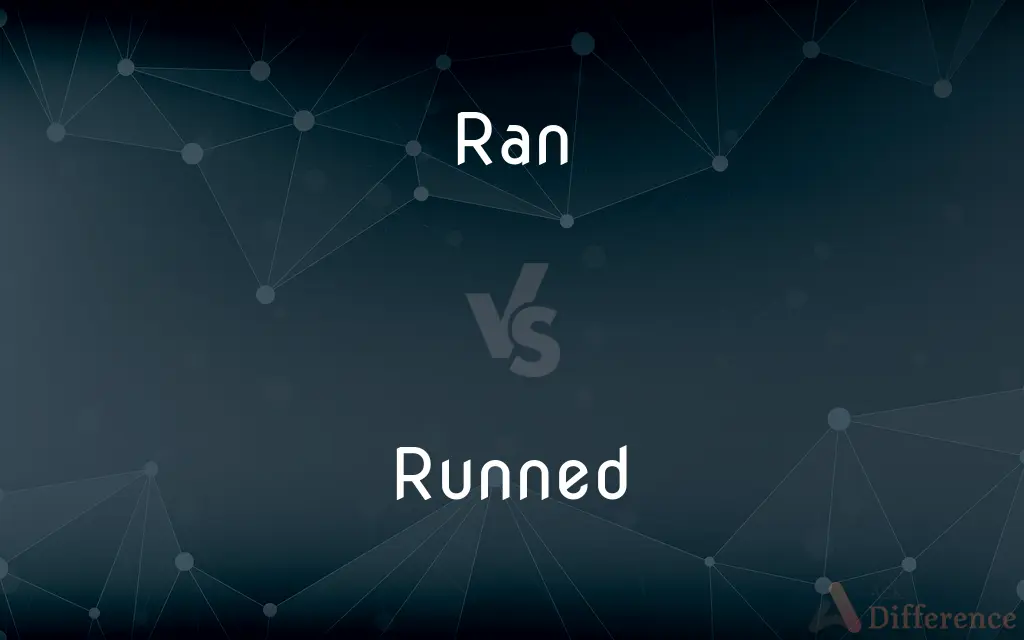Have you ever found yourself questioning the difference between “ran” and “run”, wondering which one should be used in a particular sentence? You’re not alone! Many people struggle with these seemingly interchangeable verbs, but the distinction is crucial for clear and accurate communication.

Image: telegra.ph
This article will delve into the nuances of “ran” and “run”, uncovering the reasons behind their usage and offering clarity on how to use them correctly. We’ll explore the past tense, present tense, and various grammatical scenarios, equipping you with the confidence to confidently wield these words in your writing and conversation.
The Past Tense: “Ran” for Completed Actions
“Ran” is the past tense of the verb “to run”. It signifies an action that has already happened, completed in the past. Think of it as a snapshot of an event that occurred at a specific point in time.
For instance, you might say “I ran a marathon last weekend.” This statement indicates that the action of running the marathon is now finished, a past event. “Ran” captures the completion of the action in the past.
Examples of “Ran” in Sentences
- The dog ran across the park in pursuit of the ball.
- She ran out of time to finish the project.
- The children ran through the sprinkler on a hot summer day.
The Present Tense: “Run” for Ongoing and Habitual Actions
“Run” is the present tense of the verb “to run”. This form signifies actions happening now or actions that happen regularly. It describes ongoing or habitual events.
Consider the sentence, “I run a mile every morning.” Here, “run” describes a repetitive action, a habit that takes place on a daily basis. “Run” captures the ongoing nature of the activity.

Image: www.askdifference.com
Examples of “Run” in Sentences
- He runs the company with great efficiency.
- The water runs continuously from the leaky faucet.
- My watch runs slow.
Other Forms of “Run”
Beyond the basics of “ran” and “run”, it’s helpful to understand the other forms of the verb “to run”:
Present Participle: “Running”
“Running” is used to describe an ongoing action, often with the “be” verb: “I am running a race”, “The clock is running”, etc. “Running” emphasizes the continuous nature of the action.
Past Participle: “Run”
In some cases, “run” itself can function as a past participle, used with the “have” verb to form perfect tenses. Examples include “I have run a marathon”, “She has run the company for five years”.
Tips for Using “Ran” and “Run” Correctly
When in doubt about whether to use “ran” or “run”, ask yourself these questions:
- Is the action completed in the past? If so, use “ran”.
- Is the action ongoing or happening regularly? If so, use “run”.
Practice using “ran” and “run” in a variety of sentences to solidify your understanding. Reading texts aloud can also help to internalize the correct usage of these words.
FAQ: Your Questions Answered
Q: Can I use “run” for past events if I’m just talking about the activity itself?
A: No, “run” should only be used for past events if you’re talking about a repeated action or a habit. For example, “I ran every day last week” means you ran on each of those days.
Q: Is “run” ever used as a noun?
A: Yes, “run” can be used as a noun, for example, “She scored a run in the game”, or “Her car has a run”.
Q: Is “ran” ever used as a noun?
A: No, “ran” is only used as the past tense verb.
Ran Vs Run
Conclusion: Mastering the Past Tense and Present Tense
Understanding the nuances between “ran” and “run” is essential for clear, accurate communication. Remember, “ran” signifies completed actions in the past, while “run” indicates ongoing or habitual actions. Keep these guidelines in mind to confidently use “ran” and “run” in your writing and speech.
Are you interested in learning more about grammar and usage? Let us know what topics you’d like to explore in future articles!

:max_bytes(150000):strip_icc()/OrangeGloEverydayHardwoodFloorCleaner22oz-5a95a4dd04d1cf0037cbd59c.jpeg?w=740&resize=740,414&ssl=1)




